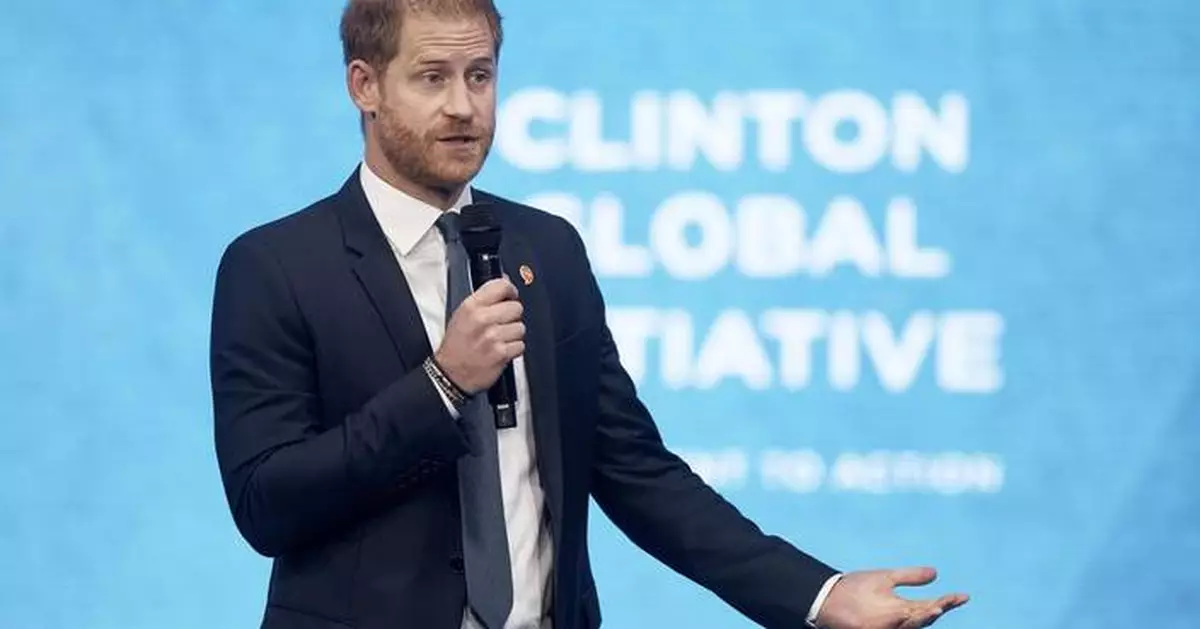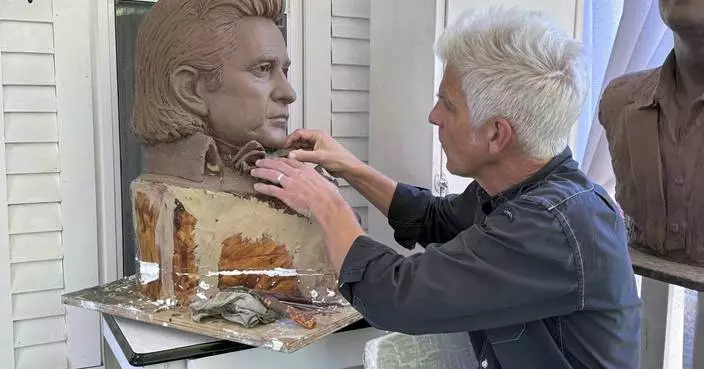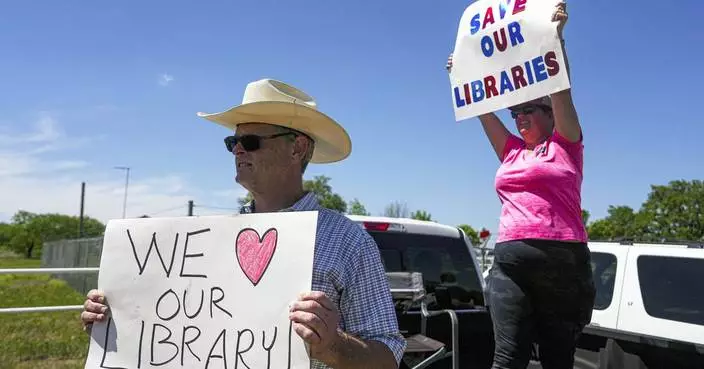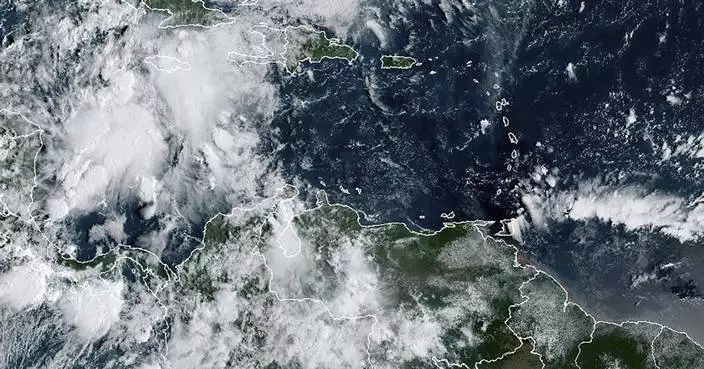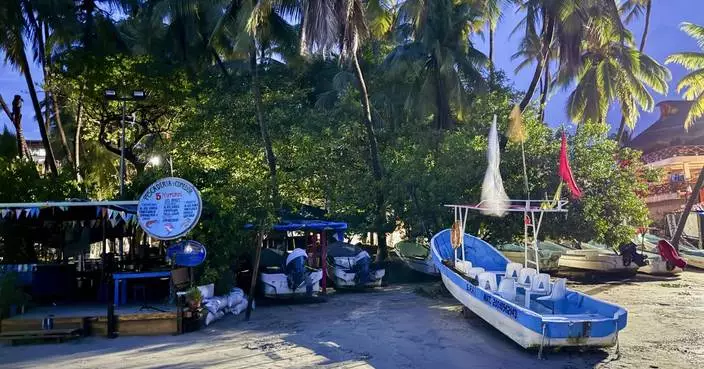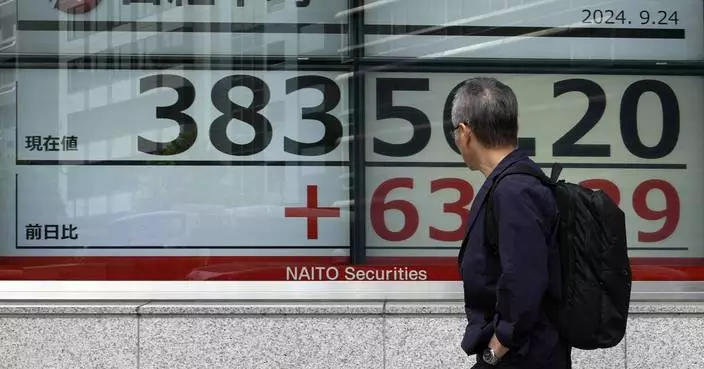NEW YORK (AP) — Prince Harry said today's youth is in the midst of an “epidemic” of anxiety, depression and social isolation due to negative experiences online, as he brought his campaign to help children and their parents navigate cyberspace to this week's Clinton Global Initiative.
“These platforms are designed to create addiction,” Harry, 40, said in remarks Tuesday in New York City. “Young people are kept there by mindless, endless, numbing scrolling — being force-fed content that no child should ever be exposed to. This is not free will.”
Beyond supporting parents and youth throughout this advocacy, The Duke of Sussex stressed the need for corporate accountability. He asked why leaders of powerful social media companies are still held to the “lowest ethical standards" — and called on shareholders to demand tangible change.
“Parenting doesn’t end with the birth of a child. Neither does founding a company," said Harry, who revealed that his smartphone lock screen is a photo of his children, five-year-old Prince Archie and three-year-old Princess Lilibet. "We have a duty and a responsibility to see our creations through.”
Harry’s remarks arrive as pressures continue to mount on tech giants like Meta, Snap and TikTok to make their online platforms safer, particularly for younger users. Many children on these platforms are exposed to content that is not age appropriate, such as violence, or misinformation. Others face unrealistic beauty standards, bullying and sexual harassment.
Companies have made some changes over the years — with Instagram, for example, announcing last week that it would be making teen accounts private by default in a handful of countries. But safety advocates have long-stressed that there’s more work to be done. Many also maintain that companies still put too much responsibility on parents when it comes to keeping children safe on social media.
Harry's contribution to this year's CGI annual meeting was part of the “What's Working” theme, in a panel that included former President Bill Clinton, Clinton Foundation Vice Chair Chelsea Clinton and World Central Kitchen founder Jose Andres.
The Archewell Foundation, which Harry founded with his wife, Meghan Markle, to carry out their philanthropic work recently launched an initiative supporting parents whose children have suffered or died due to online harms. Harry highlighted the work of that initiative, called The Parents Network, in his speech Tuesday.
The foundation has also partnered with the World Health Organization and others to end violence against children, an issue he and Meghan outlined during a recent trip to Colombia. Harry on Tuesday pointed to the inaugural Global Ministerial Conference on Ending Violence Against Children, which is set to take place in Bogotá this November. He said that this meeting could result in the first global agreement for prioritizing child safety and protection online.
His CGI address was part of a string of appearances for Harry in New York at the growing number of humanitarian and philanthropic events that run alongside the United Nations General Assembly Week.
On Monday, he appeared at an event for The HALO Trust, where he discussed how the work of the landmine clearing charity was influential on his late mother, Princess Diana, as well as at the 2024 Concordia Annual Summit, where he spoke with winners of The Diana Award.
“The HALO Trust’s work in Angola meant a great deal to my mother,” he said. “Carrying on her legacy is a responsibility that I take seriously. And I think we all know how much she would want us to finish this particular job.”
Harry's message on Tuesday was generally well-received at the conference.
Nia Faith, 22, co-founder of the Canadian nonprofit Revolutionnaire, which works to empower youth and uses social media to mobilize members, said she saw his presentation as a “call to action” on an issue that does not get enough attention.
“I was incredibly moved by Prince Harry’s speech,” she said. “At Revolutionnaire, we use digital advocacy and social media to empower youth to make a positive impact. We also recognized that social media is being used in a way that is harmful and detrimental to the mental health of young people.”
Faith hopes that Harry's work will convince companies and governments to take action to protect children while encouraging the use of platforms to drive more positive action.
Ashley Lashley, 25, whose Ashley Lashley Foundation works to address environmental challenges in her native Barbados by motivating young people to take action in their communities, said she was impressed by his remarks, even though she also worries about the digital divide in her country.
“His message really hit home that parents, teachers, and students really need to unite to educate each other about the safe usage of digital technology," she said. “I really believe that there needs to be a multi sectorial approach. That’s what we’re seeing here at CGI where different persons from different sectors — from governments, from private sectors, from philanthropy organizations — can really work together to ensure that there is peace and equity across all social media platforms.”
Associated Press coverage of philanthropy and nonprofits receives support through the AP’s collaboration with The Conversation US, with funding from Lilly Endowment Inc. The AP is solely responsible for this content. For all of AP’s philanthropy coverage, visit https://apnews.com/hub/philanthropy.
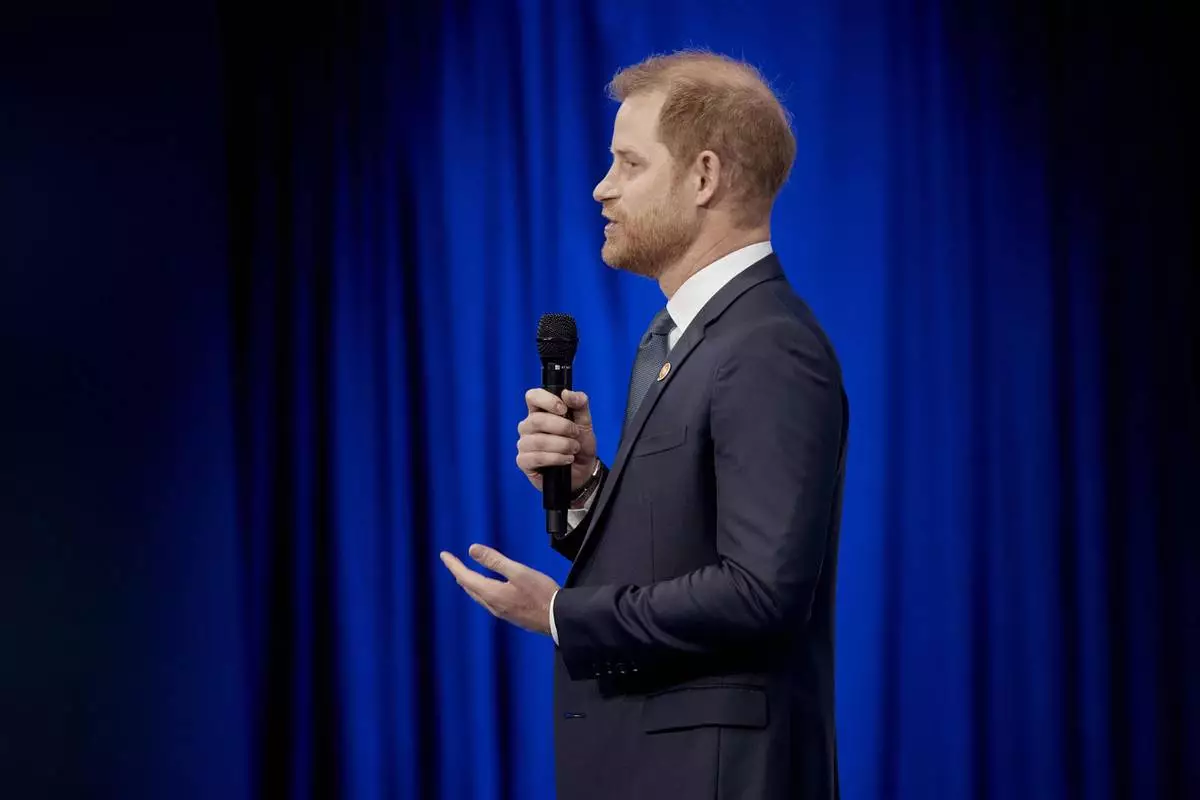
Prince Harry speaks during the Clinton Global Initiative, on Tuesday, Sept. 24, 2024, in New York. (AP Photo/Andres Kudacki)

Prince Harry speaks during the Clinton Global Initiative on Tuesday, Sept. 24, 2024, in New York. (AP Photo/Andres Kudacki)
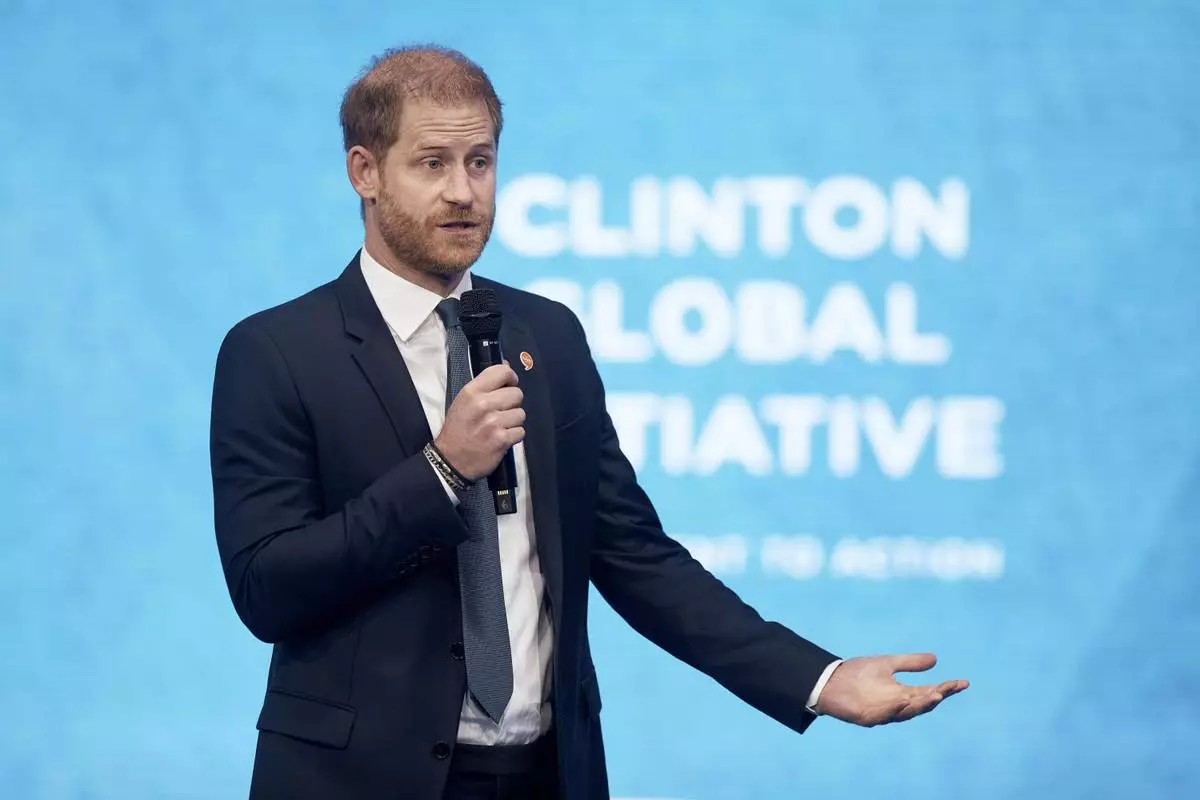
Prince Harry speaks during the Clinton Global Initiative, Tuesday, Sept. 24, 2024, in New York. (AP Photo/Andres Kudacki)
Lebanese health authorities on Tuesday raised the death toll from two days of Israeli airstrikes targeting Hezbollah militants to 558. Palestinian officials in Gaza, meanwhile, said new Israeli strikes killed at least two dozen people.
Israel’s military says it will do “whatever is necessary” to push Hezbollah away from Lebanon’s border with Israel. Israel and Hezbollah have been trading fire since the Israel-Hamas war began. On Monday, Israel launched hundreds of airstrikes in southern and eastern Lebanon, killing nearly 500 people and wounding more than 1,600 others.
Thousands of people fled southern Lebanon, jamming the main highway to Beirut in the biggest exodus since the 2006 Israel-Hezbollah war.
It's a staggering toll for a country still reeling from a deadly attack on communication devices the week before. Lebanon blamed the attacks on Israel, but Israel did not confirm or deny its responsibility.
Hezbollah again launched some 100 projectiles toward Israel on Tuesday, the Israeli military said.
Here’s the latest:
UNITED NATIONS — Israel’s envoy to the U.N. says his country doesn’t want to send troops into Lebanon but will do “whatever necessary” to halt the Hezbollah rocket fire that has driven tens of thousands of Israelis from their country’s north.
Asked during at a news conference Tuesday at U.N. headquarters whether Israel was contemplating a ground invasion of its northern neighbor, Ambassador Danny Danon said his country is “not eager to start any ground invasion anywhere.”
“We prefer a diplomatic solution. But if it’s not working, we are using other methods to show the other side that we mean business,” he said.
“We will do whatever necessary to bring the residents back to the north,” he added.
He spoke in a week that has seen rapid intensification of hostilities between Israel and the Lebanon-based militant group Hezbollah, including a wave of Israeli airstrikes that killed more than 550 Lebanese on Monday.
At the same time, Israel is nearly a year into its fight with Hamas militants in Gaza. The war was launched in response to Hamas’ Oct. 7 attack but has drawn criticism from many countries for the extent of death, destruction and suffering in the Palestinian territory.
Israeli Prime Minister Benjamin Netanyahu still plans to come to the U.N. to speak Friday at the General Assembly’s annual meeting of world leaders, Danon said. But he noted that “things are dynamic,” and an update on Netanyahu’s plans could come Wednesday.
TEL AVIV — Israel’s Defense Minister said Tuesday that Hezbollah has suffered “extremely severe blows” and Israel has “more strikes ready.”
Speaking to troops after an IDF drill that simulated a ground offensive in Lebanon, Yoav Gallant said “The Hezbollah of today is not the Hezbollah of a week ago. The sequence of blows it faced in its command and control, its operatives, its weapons -- all these things are extremely severe blows.”
SAKSAKIEH, Lebanon — In the Lebanese village of Saksakieh, some 40 kilometers (25 miles) north of the Lebanon-Israel border, mourners carried 11 bodies through the streets Tuesday, including those of four women, an infant and a 7-year old girl. All had been killed in Israel’s bombardment of the village the day before. Israeli strikes killed more than 560 people across Lebanon in two days.
Some of the bodies were draped in Hezbollah flags, others wrapped in black clothes. A wreath of flowers had been placed on top of the smallest one.
Mohammad Halal, the father of 7-year-old Joury Halal, said his daughter was an “innocent child martyr.”
“She is a martyr for the sake of the south and Palestine,” Halal said and defiantly stated his allegiance to Hezbollah leader Hassan Nasrallah.
NEW YORK — White House principal deputy national security adviser Jon Finer said Tuesday that Biden administration officials were in talks with allies to help find an off-ramp to the escalating tensions between Israel and Hezbollah.
“We’re working on that in real time right here in New York and in capitals around the world,” Finer said in an appearance at an event hosted by the news site Axios on the sidelines of the U.N. General Assembly in New York.
“We’re not going to reveal all the details of those sensitive conversations, but we very much want that conflict to de-escalate.”
Finer sidestepped questions about whether the fighting has already become the all-out war that the U.S. had been pressing Israel to avoid with Lebanon as it continues its nearly yearlong conflict in Gaza. But he underscored that a “big war, a wider war” is in neither Israel’s nor Lebanon’s interest.
DEIR AL-BALAH, Gaza Strip — Another Israeli airstrike in a central Gaza refugee camp on Tuesday killed 10 Palestinians, including four people from the same family, and injured 11 others, according to Al-Awda Hospital.
The strike hit a house in the Nuseirat refugee camp, where six people including three women were killed in an earlier airstrike.
The dead and wounded were taken to Al-Awda Hospital.
JERUSALEM — The Israeli military says it has killed a commander with Hezbollah’s missile and rocket unit in a strike in Beirut.
It said Ibrahim Kobeisi, who it said was responsible for launches toward Israel, was killed Tuesday.
The military said “other key commanders” were with Kobeisi at the time of the strike, but it did not say whether any of them had been killed or injured.
BEIRUT — The U.N. refugee agency in Lebanon says a Lebanese woman who had been working for the agency for 12 years, one of her sons and a cleaner employed by the agency have been killed in Israeli airstrikes.
The building where Dina Darwiche lived with her family was hit in a strike on Lebanon's Bekaa region on Monday, UNHCR said. Her husband and another child were seriously injured. Her body and that of her younger son were recovered from the rubble on Tuesday.
Ali Basma, who worked as a cleaner for the agency for seven years, was killed in a separate strike in the south. He worked at UNHCR’s office in the city of Tyre.
The U.N. refugee agency said it was “outraged and deeply saddened by the killing of two beloved members of the UNHCR family in Lebanon.”
It said the protection of civilians is a must under international humanitarian law.
BEIRUT — An Israeli airstrike hit a building in a southern Beirut suburb on Tuesday afternoon, a Hezbollah TV station reported. There was no immediate word on casualties.
Later, Israel’s military said it had carried out a “targeted strike” in Beirut, without elaborating. Lebanon’s state-run National News Agency said “a number of people” were injured in the strike , which destroyed three floors of a six-story apartment building.
Al-Manar TV, which belongs to Lebanon’s militant Hezbollah group, said the strike occurred in the suburb of Ghobeiri, without giving any details.
The attack came after a Monday evening airstrike missed Ali Karaki, Hezbollah's top military commander in south Lebanon, the group said.
An Israeli airstrike on a nearby area on Friday killed 55 people, including top Hezbollah military commander Ibrahim Akil and 15 other Hezbollah members.
JERUSALEM — Israel’s military said on Tuesday afternoon that 10 more rockets from Lebanon were fired into Israeli territory, injuring a reservist and raining shrapnel onto a road in northern Israel.
The rockets came in two volleys, the first targeting the Upper Galilee area and the second an area south of Haifa known as Eliakim. Rocket fragments from a rocket that was intercepted injured the Israeli soldier, the military said.
Hezbollah said it had fired middle-range rockets at an Israeli army position in Eliakim.
Israel’s military has now said that there have been at least 110 rockets fired into Israeli territory from Lebanon since Tuesday morning. Israeli strikes on the other side of the border have killed over 550 people since Monday.
DEIR AL-BALAH, Gaza Strip— Palestinian medical officials say an Israeli airstrike hit a family house in central Gaza on Tuesday afternoon, killing at least six people, including three women .
The strike occurred in the Nuseirat refugee camp and also wounded 21 others, according to the Awda hospital in the camp, where the casualties were taken.
Footage circulated online showing a woman screaming and rushing to a building that was hit. A man was seen lying on the ground, without moving and bleeding from his head. There were several other people lying on the ground nearby.
BEIRUT — Lebanon’s Health Ministry said on Tuesday that the death toll from Israeli airstrikes in Lebanon over the past two days of escalation has reached 558, including 50 children and 94 women.
Health Minister Firass Abiad told reporters that 1,835 people have also been wounded since early Monday. They were taken to 54 hospitals around Lebanon, he said.
Abiad added that four paramedics were among those killed, and 16 paramedics and firefighters were among the wounded.
BEIRUT — A journalist working for the pan-Arab network Al-Mayadeen was killed in Israeli airstrikes while he was at his home in southern Lebanon, the network said Tuesday.
Hadi Al-Sayyed, 22, is the third journalist from the network killed in the ongoing conflict between the Israeli military and Lebanon's militant Hezbollah group. The network said he was wounded on Monday and died of his wounds on Tuesday.
According to the TV station, Al-Sayyed worked for the Al-Mayadeen’s online section and was at his house in the town of Burj Rahhal near the southern city of Tyre when it was hit in the airstrike.
Last November, Al-Mayadeen's correspondent Farah Omar and cameraman Rabih Al-Maamari were killed in an Israeli strike while covering southern Lebanon.
Reuters video journalist Issam Abdallah was killed in Israeli shelling last October while covering the clashes alongside colleagues from the news agency as well as reporters from Qatar’s Al-Jazeera TV and France’s international news agency, Agence France-Presse. His colleagues were all wounded but survived the attack.
JERUSALEM — Bombardment from Lebanon on Tuesday damaged a supermarket in Israel’s Arab city of Tamra, where the majority of residents are Palestinian citizens of Israel.
The attack spread fear through the community, which has no shelters. It was not immediately clear whether the supermarket was hit by a rocket that permeated Israel’s missile defense system or by shrapnel falling from an interception.
“I came here immediately to see what exactly happened,” said Jamal Diab, a friend of the market’s owner. “I saw here lots of damage.”
Tamra has no shelters, according to its mayor, Mousa Abu Rumi. An Israeli state comptroller’s report found in 2018 that only 11 out of 71 Arab local communities have public shelters.
He told The Associated press that Tamra's residents have been instructed to find “the most protected place” nearby to seek shelter when they hear rocket sirens go off.
DEIR AL-BALAH, Gaza Strip — A hospital in central Gaza said the bodies of two children killed in an Israeli airstrike on Tuesday were brought there.
The Awda hospital in the Nuseirat refugee camp said the strike hit a group of people in the nearby Bureij camp, and also wounded six other Palestinians.
The Health Ministry in the coastal territory, meanwhile, said Gaza’s hospitals received 12 dead and 43 wounded Palestinians over the last 24 hours.
The latest fatalities brought the overall death toll in Gaza since the war began on Oct. 7 to 41,467, and 95,921 wounded, said the ministry, which doesn’t differentiate between combatants and civilians in its count.
JERUSALEM — Israel’s military said that 100 rockets had been fired from Lebanon into northern Israel since the early hours of Tuesday morning, setting several fires and damaging buildings in the country’s north in the second day of much-intensified hostilities between Israel and Hezbollah.
The rockets came in five volleys throughout the morning, the largest of them containing 50 rockets toward the Upper Galilee area. The military said it had struck the launchers where the rockets were fired. Another heavily-targeted area was southeast of the Israeli city of Haifa.
Rocket sirens blared throughout the morning in the country’s north. A video circulating on Israeli media showed explosions on a highway, with drivers pulling over and lying on the ground next to their vehicles.
Galilee Medical Center, a northern Israel hospital, said that two patients arrived to the hospital with minor head injuries from a rocket falling near their car. Several others were being treated for light wounds from running to shelters and traffic accidents when alarms sounded.
Hezbollah has been sending heavy volleys of rockets into Israel as Israel intensifies its operation in Lebanon. In Monday, Israeli strikes killed nearly 500 people, Lebanese health officials say, and Israel’s military ordered the south of the country evacuated.
BEIRUT — Lebanese families displaced from villages farther south slept in shelters hastily set up in schools in Beirut and the coastal city of Sidon. Some who did not find shelter elsewhere slept in cars and parks and on the seaside corniche.
Monday’s heavy bombardment sent thousands fleeing from south Lebanon. Hotels in Beirut were quickly booked to capacity and apartments in the mountains surrounding the capital were snapped up by families seeking safe accommodations.
Some offered up empty apartments or rooms in their houses in social media posts, while volunteers set up a kitchen at an empty gas station in Beirut to cook meals for the displaced.
In the eastern city of Baalbek, the state-run National News Agency reported that lines formed at bakeries and gas stations as residents rushed to stock up on essential supplies in anticipation of another round of strikes on Tuesday.
DUBAI, United Arab Emirates — Data from fire-tracking satellites used by the United States showed the wide range of Israeli airstrikes that target southern Lebanon, an Associated Press analysis Tuesday showed.
NASA’s Fire Information for Resource Management System typically is used by experts to track wildfires across rural areas of the U.S. However, they also can be used to track the flashes and burning that follow airstrikes. That’s particularly true when an airstrike ignites flammable material on the ground, like munitions or fuel.
On Monday, Israel launched hundreds of airstrikes in southern and eastern Lebanon, killing nearly 500 people and wounding more than 1,600 others. Thousands of people fled southern Lebanon, jamming the main highway to Beirut in the biggest exodus since the 2006 Israel-Hezbollah war.
Data from Monday show significant fires breaking out across southern Lebanon, stretching from the border with Israel as far north as Mashghara in the Bekaa Valley, some 20 kilometers (more than 10 miles) from the border. The area of the strikes is over 1,700 square kilometers (650 square miles).
There were several areas that showed multiple, intense fires. One was near the southern coastal town of Naqoura, which hosts a base for the United Nations peacekeeping mission in southern Lebanon known as UNIFIL. Others were in rural areas or villages.
Since its creation at the start of Israel’s occupation of Lebanon from 1982 to 2000, the Shiite militia Hezbollah is believed to have stockpiled weapons and missiles throughout southern Lebanon as a deterrent to Israel.
JERUSALEM — The United States Embassy in Jerusalem has restricted American government employees from traveling to Israel’s north after a heavy exchange of fire between Israel and Lebanon’s Hezbollah militant group.
The embassy said Tuesday that employees require an armored vehicle and prior approval to travel to a large region of the north that includes the bustling coastal city of Haifa.
The U.S. State Department meanwhile urged American citizens to leave the country, where Israeli strikes killed nearly 500 people on Monday.
DEIR-Al-BALAH, Gaza Strip — Palestinian officials say Israel’s strikes early Tuesday killed at least seven people in Gaza’s southern city of Khan Younis. At least 15 others, including women and children, were injured in the strikes, they said.
The civil defense said the dead include five people who were killed in a strike on the Abu Harb family house in the Qizan al-Najjar area. The strike also wounded at least 10 others, it said.
Another strike hit a house in the Tahlia area in Khan Younis, killing at least two people and wounding five others, according to the rescue service. The casualties from both strikes were confirmed in hospital records in Khan Younis.
Israel says it tries to avoid harming civilians but rarely comments on individual strikes.
Gaza’s Health Ministry says over 41,000 Palestinians have been killed since the start of the war. It does not say how many were fighters, but says a little over half were women and children.
The war began when Hamas-led militants stormed into southern Israel on Oct. 7, killing some 1,200 people, mostly civilians, and abducting around 250. Around 100 of the captives are still being held in Gaza, and a third of them are believed to be dead.
Airlines in the United Arab Emirates, a key East-West travel hub, canceled flight Tuesday to Lebanon over the ongoing cross-border fire between Israel and Hezbollah.
Long-haul carriers Emirates and Etihad canceled flights, as did FlyDubai, the low-cost carrier.
The United Arab Emirates, which reached a diplomatic recognition deal with Israel in 2020, is home to a large Lebanese population.
Egypt’s flagship airliner also canceled its flights to Lebanon on Tuesday. EgyptAir operates two flights daily between Cairo and Beirut. It said the cancellation will stay in place until “the signal stabilizes.”
Also Tuesday, Israeli media reported that Wizz Air, British Airways, Iberia and Azerbaijan Airlines were among several airlines to cancel flights to Israel’s major airport, Ben-Gurion airport in Tel Aviv.
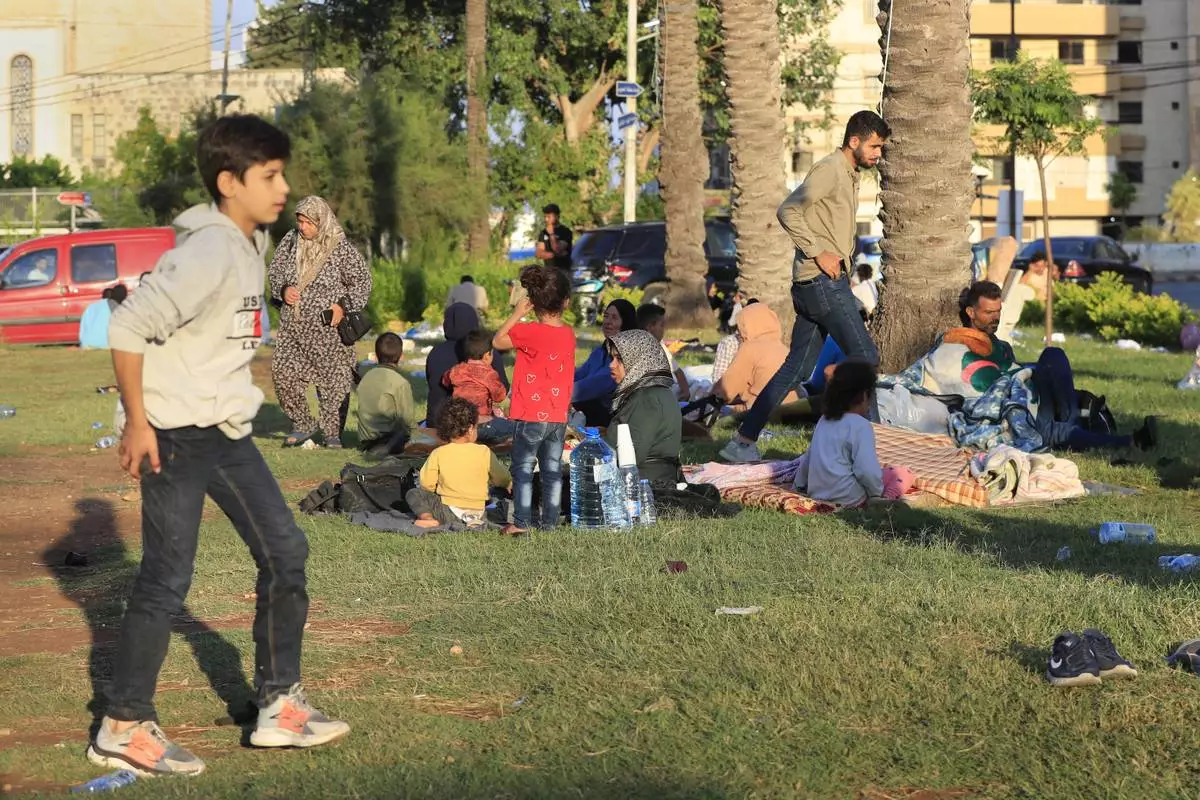
Lebanese citizens who fled the southern villages amid ongoing Israeli airstrikes Monday, settle at a public park in the southern port city of Sidon, Lebanon, Tuesday, Sept. 24, 2024. (AP Photo/Mohammed Zaatari)
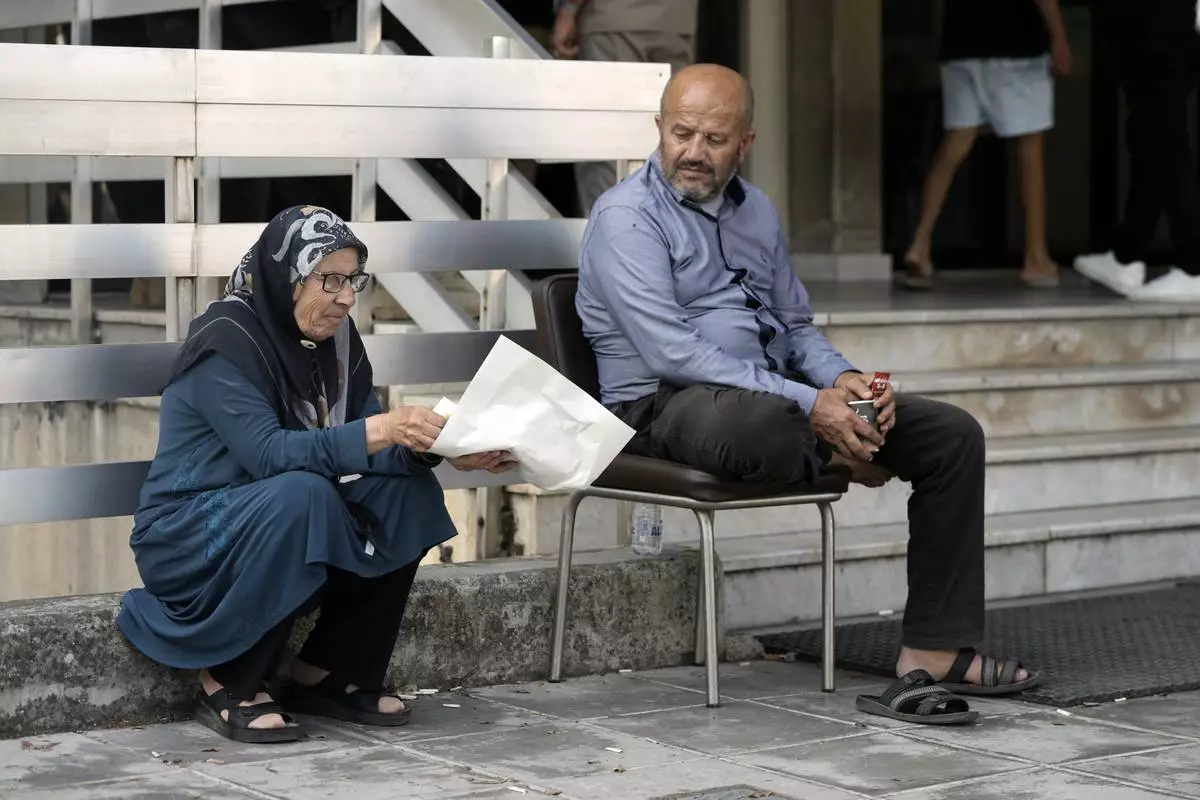
A couple sit outside a school turned into a shelter in Beirut, after fleeing the Israeli airstrikes in the southern village of Houla, Tuesday, Sept. 24, 2024. (AP Photo/Bilal Hussein)
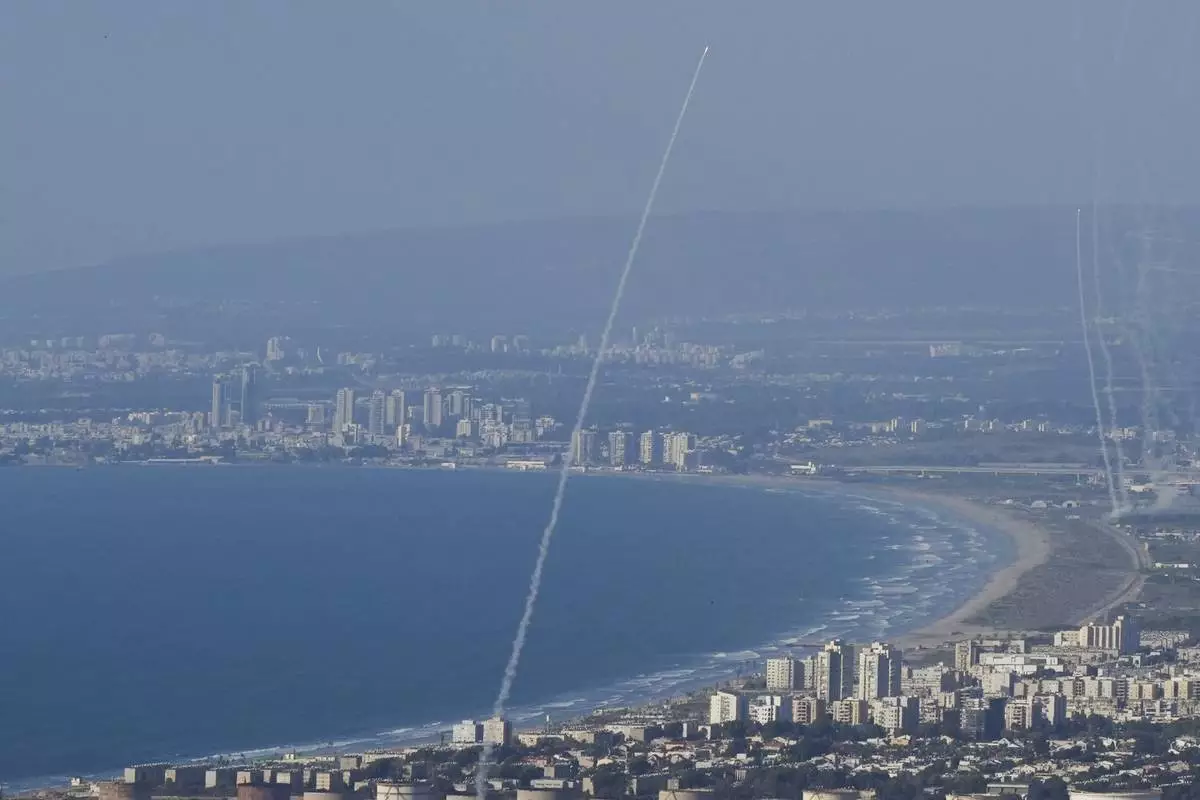
Israeli Iron Dome air defense system fires to intercept rockets that were launched from Lebanon, in northern Israel, Monday, Sept. 23, 2024. (AP Photo/Baz Ratner)
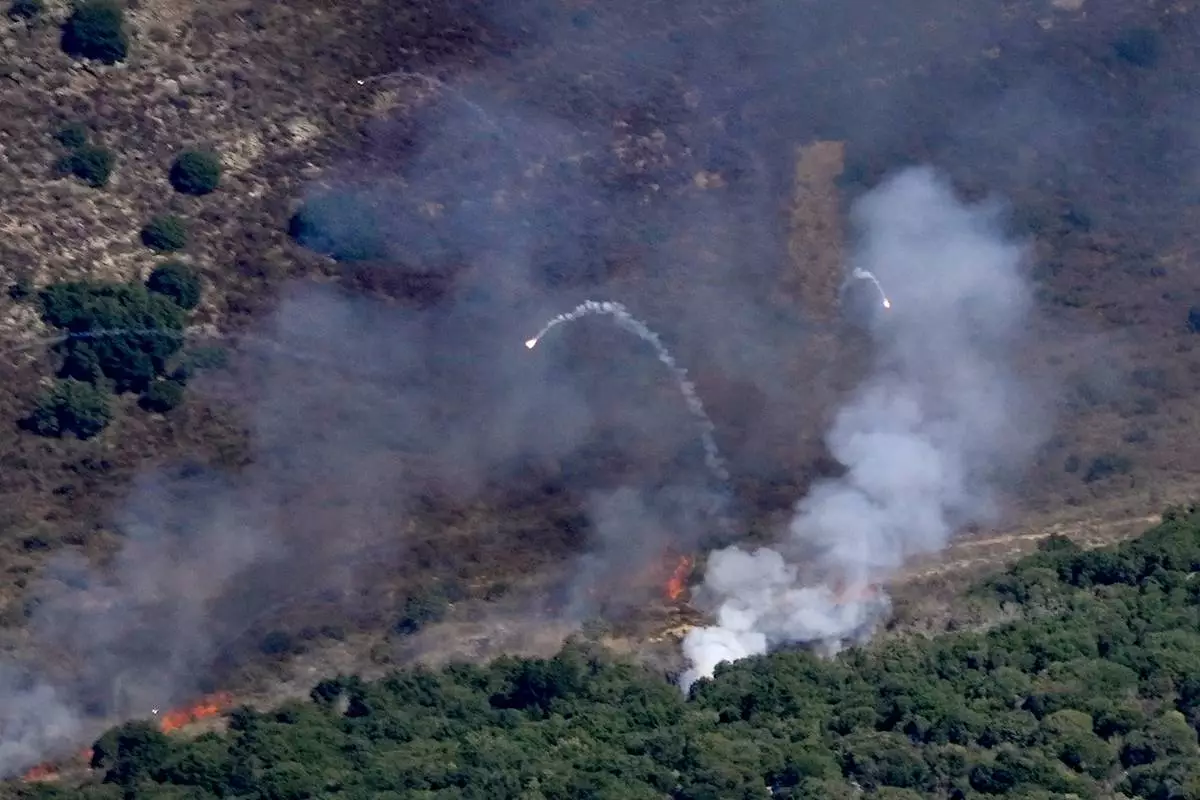
Flames and smoke rise from an Israeli airstrike on Mahmoudieh mountain, as seen from Marjayoun town, south Lebanon, Tuesday, Sept. 24, 2024. (AP Photo/Hussein Malla)
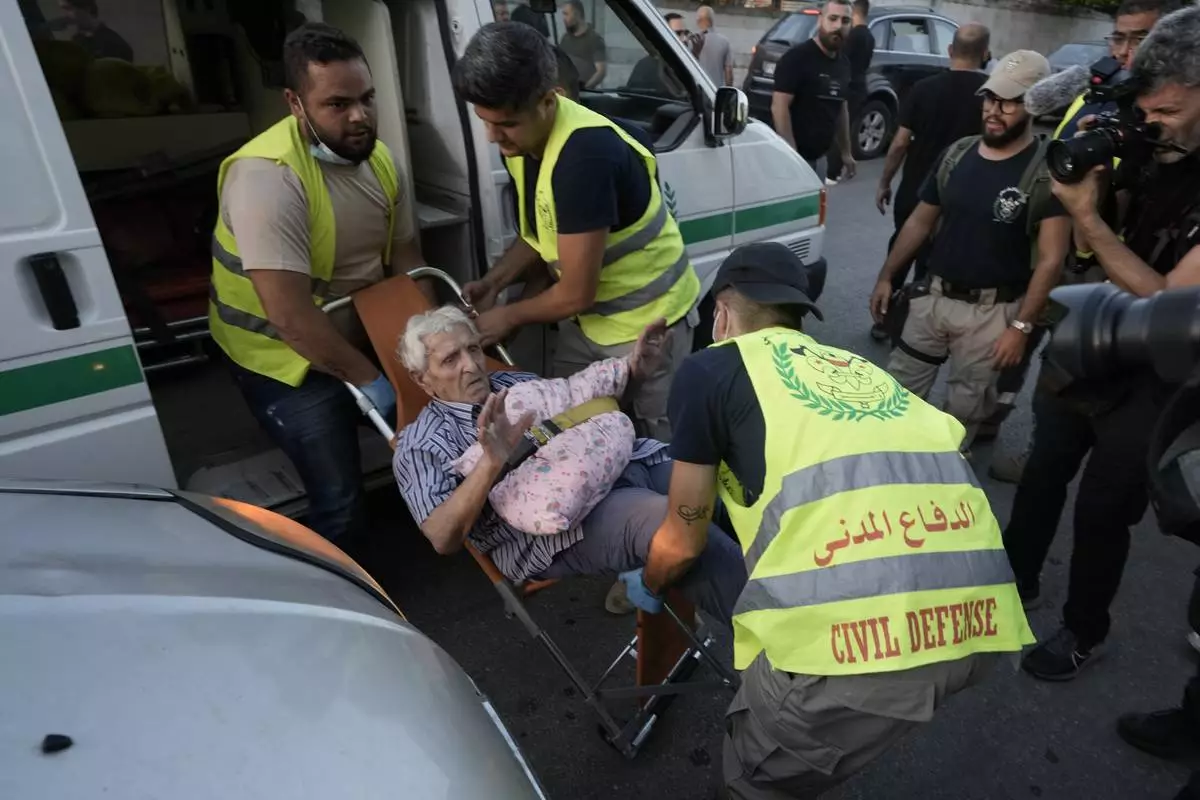
Civil defense workers carry an elderly, fleeing the south, as he arrives at a school turned into a shelter in Beirut, Monday, Sept. 23, 2024. (AP Photo/Bilal Hussein)
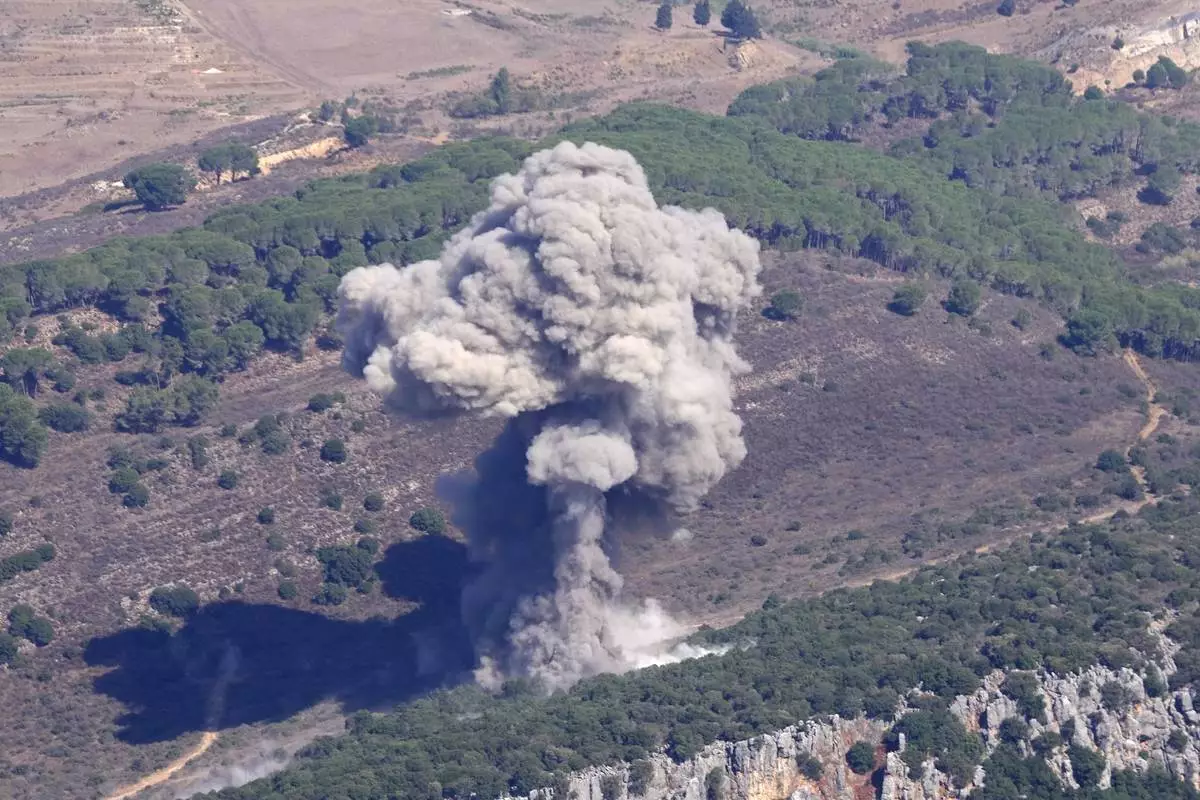
Smoke rises from an Israeli airstrike on the Mahmoudieh mountain, as seen from Marjayoun town, south Lebanon, Tuesday, Sept. 24, 2024. (AP Photo/Hussein Malla)
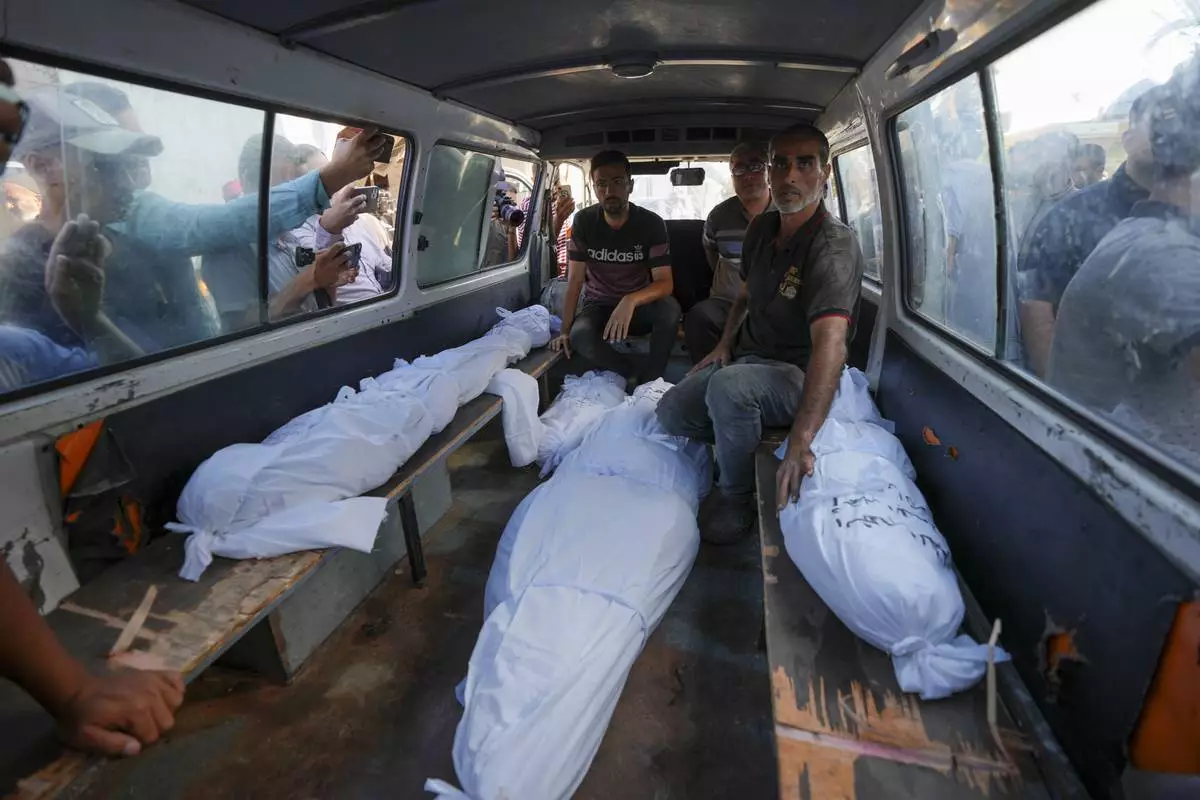
Mourners transport the bodies of their relatives killed in the Israeli bombardment of the Gaza Strip during their funeral in Deir al-Balah, Gaza, Monday, Sept. 23, 2024. (AP Photo/Abdel Kareem Hana)
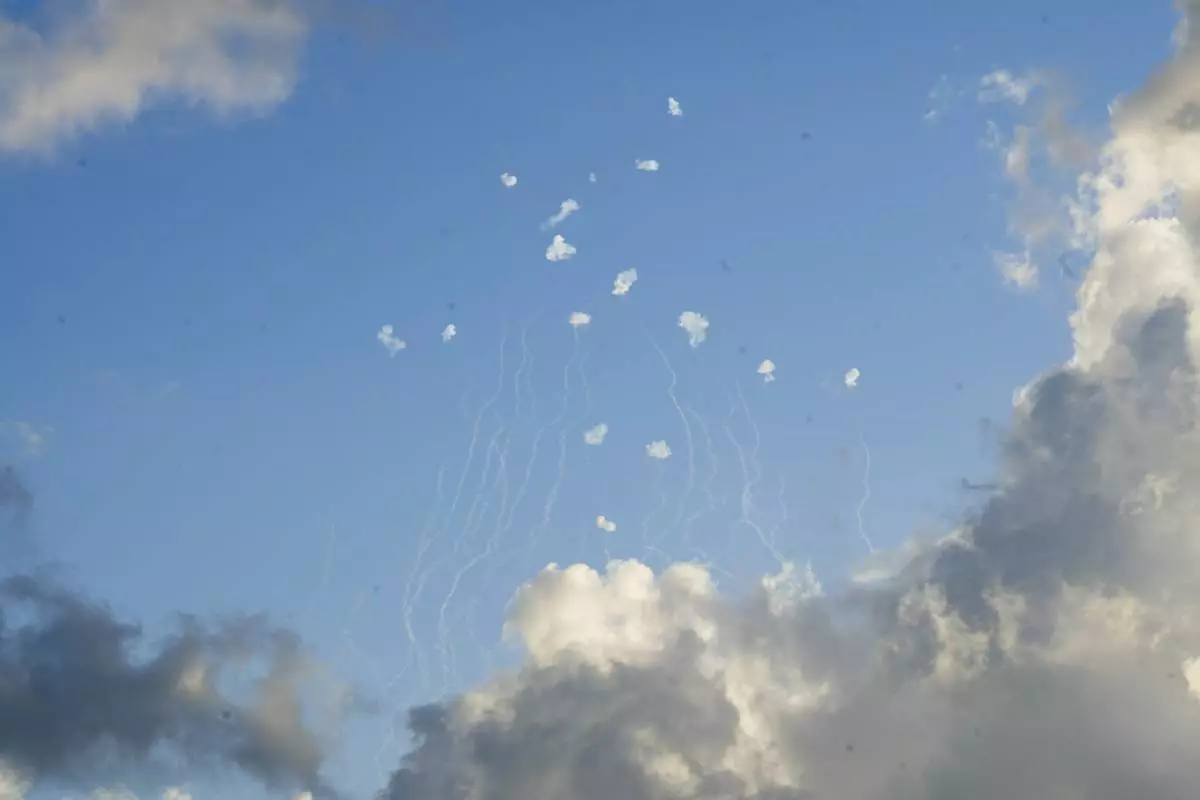
Israeli Iron Dome air defense system fires to intercept rockets that were launched from Lebanon, in northern Israel, Sunday, Sept. 22, 2024. (AP Photo/Baz Ratner)
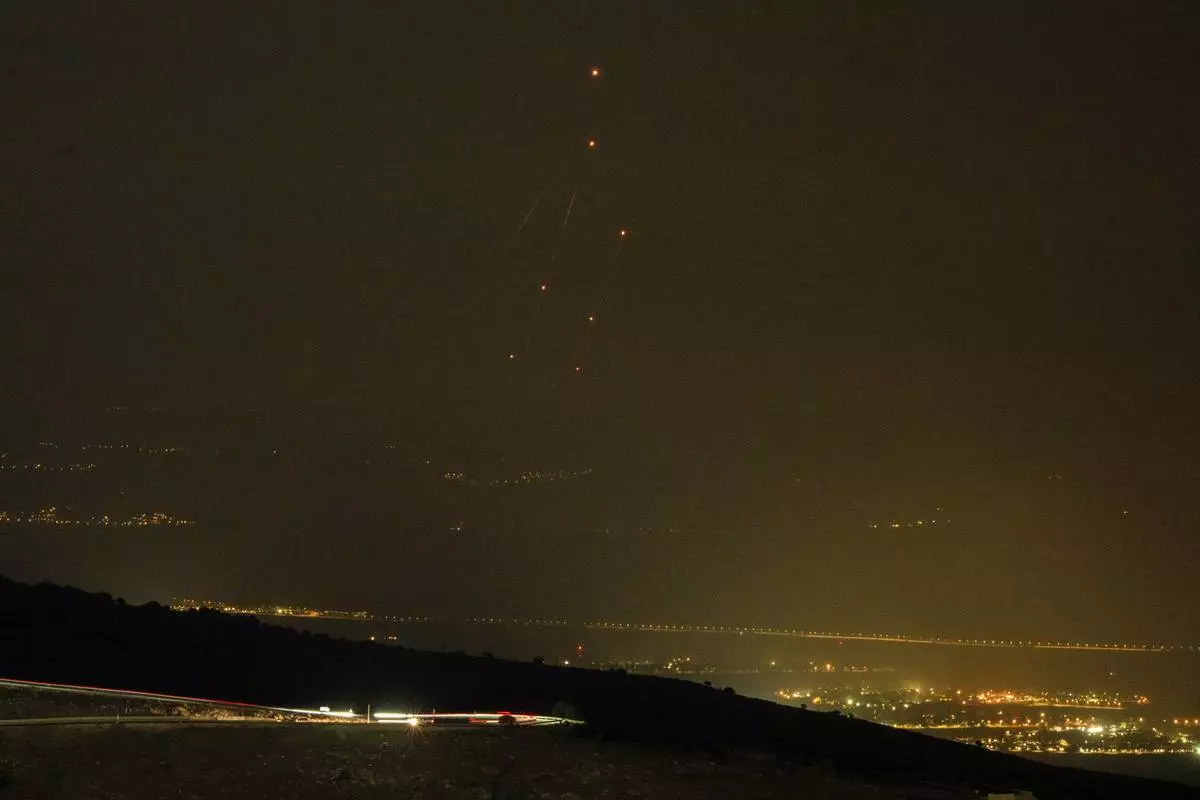
Israeli Iron Dome air defense system fires to intercept rockets that were launched from Lebanon, in northern Israel, Monday, Sept. 23, 2024. (AP Photo/Leo Correa)
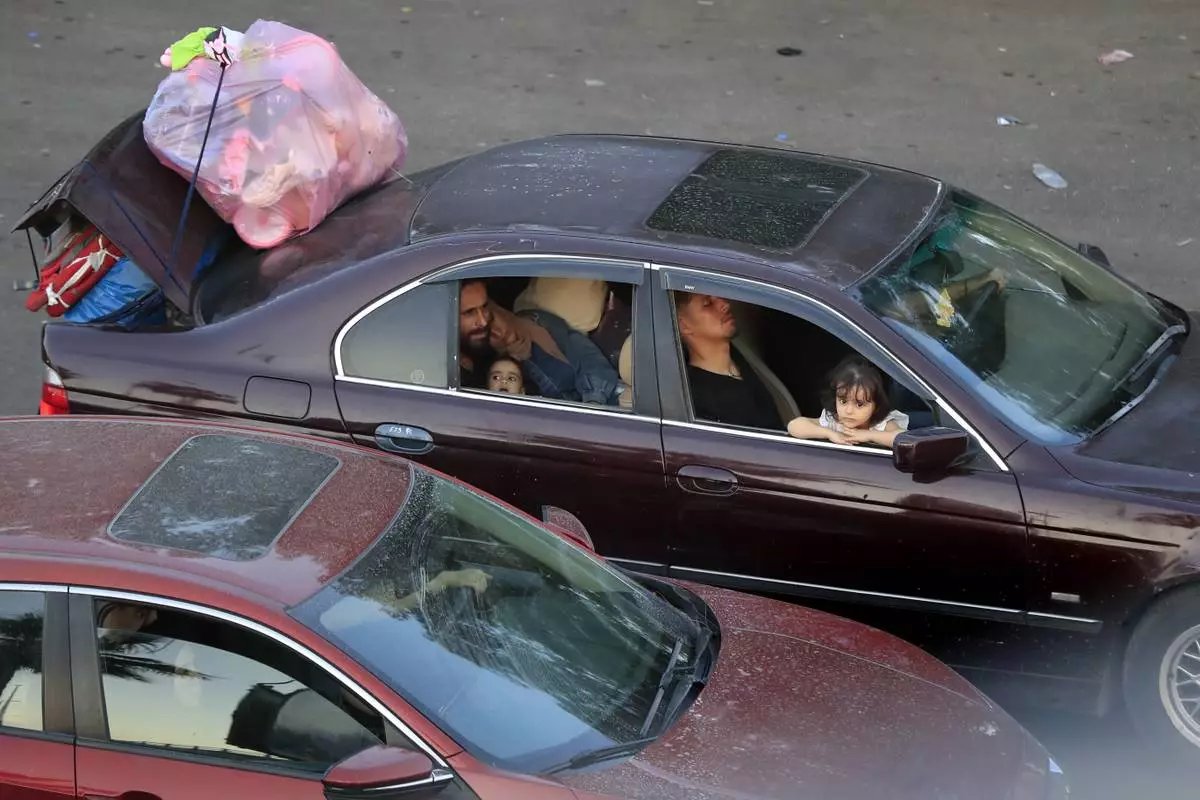
Lebanese citizens who fled the southern villages amid ongoing Israeli airstrikes Monday, sit in their cars at a highway that links to Beirut city, in the southern port city of Sidon, Lebanon, Tuesday, Sept. 24, 2024. (AP Photo/Mohammed Zaatari)
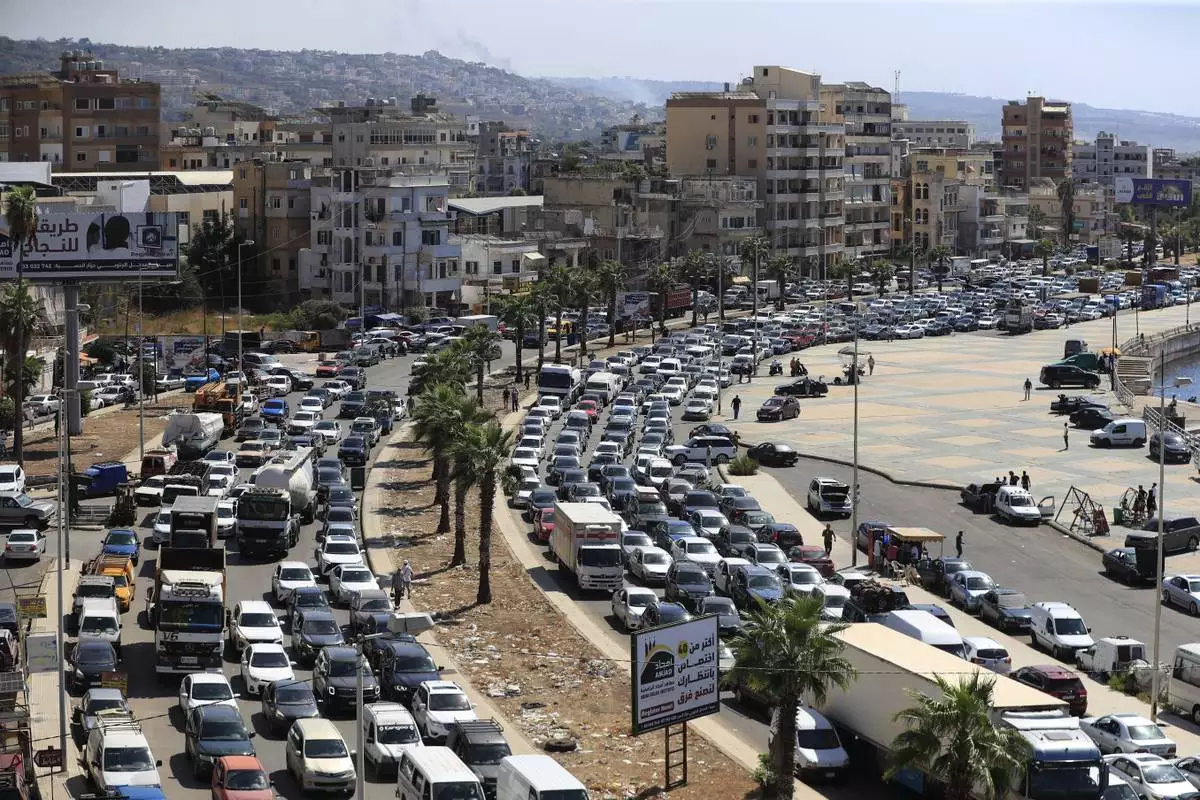
Cars sit in traffic as they flee the southern villages amid ongoing Israeli airstrikes, in Sidon, Lebanon, Monday, Sept. 23, 2024. (AP Photo/Mohammed Zaatari)





